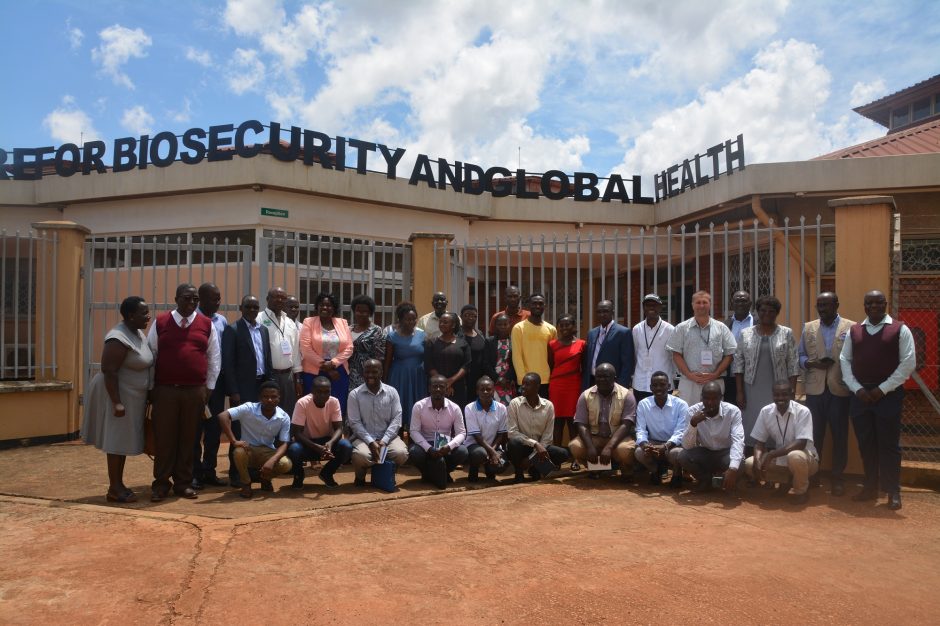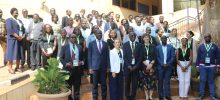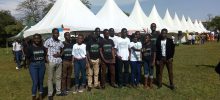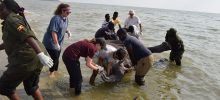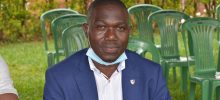The Africa Union Inter-African Bureau for Animal Resources (AU-IBAR) mission at Makerere University.
Story by Harriet Musinguzi
Makerere University has been subjected to an assessment to determine its suitability for hosting a Regional Centre of Excellence in Fisheries and Aquaculture in Africa. The evaluation follows a jointly submitted Expression of Interest by the College of Veterinary Medicine, Animal Resources and Biosecurity (CoVAB) and the College of Natural Sciences (CoNAS).
The Africa Union Inter-African Bureau for Animal Resources (AU-IBAR) mission was at Makerere from 11th to 12th March 2024, specifically at the colleges that offer fisheries-related programs, CoVAB and CoNAS where they looked at the suitability of the existing Teaching and Research Facilities and other parameters necessary for the establishment of a center of excellence.
The team comprised of Etienne Hinrichsen the leader together with Patrick Karani, from AU IBAR, and Daniel Adjei Boateng the Aquaculture Expert on the mission undertook a two-day in-depth review of the state of affairs of Makerere University to make an informed decision regarding its suitability to host the center. According to Etienne Hinrichsen, aquatic animal health has a leg in various areas, and staff within the institution were better placed to understand this unlike those from outside. He said their excursion in Makerere offered a learning experience that would enrich their evaluation. It is always difficult to evaluate something while on your desk and it gets much richer when you see it on the ground, he said while appreciating the staff that took them around. A lot was seen in terms of physical infrastructure and what remains now is to correlate the human capacity to determine what AU AIBAR can do for you or what you can do as a center of excellence in Africa, he observed. He observed that Makerere University was already collaborating with the National Fisheries Resources Research Institute (NaFFIRI), which was an advantage because of its good relations with AU. Other areas of concern he said, include accessibility matters for international students since the center will serve the entire continent.

(L_R) Prof. Charles Masembe (CoNAS), Dr. Papias Tibihika (NARO-Kajjanzi) Dr. Etienne Hinrichsen (AU-IBAR), Prof. Barnabas Nawangwe (VC), Assoc. Prof. Jesca Nakavuma (CoVAB), Dr. Patrick Karani (AU-IBAR), Dr. Daniel Adjei Boateng (AU-IBAR), paid a courtesy call to the Vice Chancellor Prof. Barnabas Nawangwe
While interacting with the AU AIBAR mission, the Vice Chancellor, Prof. Barnabas Nawangwe, expressed optimism that Makerere University was best suited to host the center since it had in place all that was needed to offer the required training and research. He said the university’s move towards becoming research-led and the various policies and facilities in place were fertile ground for taking on training in the fisheries sector, an area that was increasingly getting onboard due to the demand for fish in the country and the region. ‘If the AU mission is to allow us to do even better in what we are doing, I will be delighted,’ he said adding that the university was a host of students from 39 other countries who would also be beneficiaries since Uganda has a big coverage of lakes and rivers coupled with the increase in the fish farming enterprise. Further, he said with the exploding population in Africa, unless we find solutions for food security, we must be prepared for very unstable people shortly, justifying why Makerere University should host the center of excellence.
The mission interacted with a section of members of staff and graduate students both at CoVAB and CoNAS.

The team interacted with international students in the AWaRMN program at CoNAS and drew lessons
The AU-IBAR verification visit to Makerere University as one of the institutions for selection as Africa Centers of Excellence in Fisheries and Aquaculture reviewed several areas including
- existence of the relevant curricula;
- related disciplines taught in the institution;
- number of staff in disciplines like qualification and years and nature of experience;
- Percentage of students from each cohort that have graduated from the institution over the past;
- capacity to undertake research and develop new information and technology;
- peer-reviewed publications, popular articles, and other information targeting stakeholders;
- relevant policies, administrative, and financial management systems in place.

A visit at some of the teaching facilities at CoVAB

A visit at some of the teaching facilities at CoNAS
Once selected, Makerere University will champion the training in Fisheries and Aquaculture through graduate training in Masters, PhD, and short-term courses, as well as applied research in the form of partnerships and collaborations with other institutions and the private sector.

One of the labs visited
Makerere University hosts the Centre of Materials, Product Development and Nanotechnology (MAPRONANO) and Makerere Centre for Crop Investment (MaRCCI)
Pictorial












